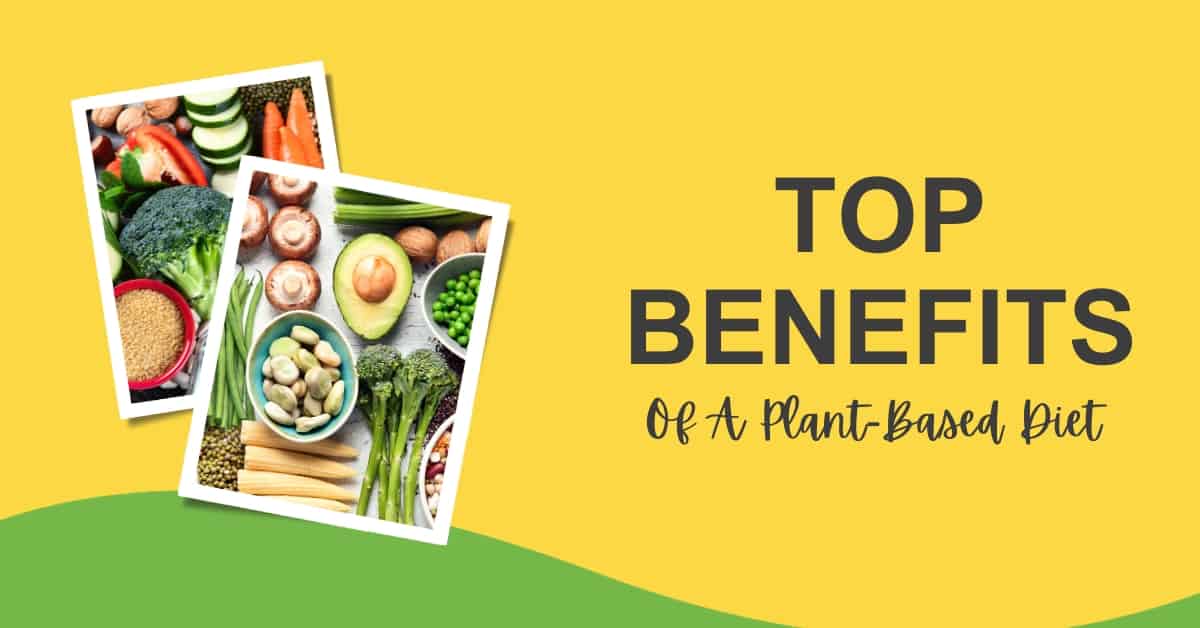Top Benefits Of Plant Based Diet
December 6, 2023

Why Are Plant-Based Diets So Popular?
In a world where health consciousness is on the rise, more people than ever are making the transition to a predominantly plant-based diet. Plant-based or plant-forward eating patterns focus on foods primarily from plants. Customers are starting to actively choose more foods from plant sources to reap long-term benefits. Currently, 7.3 million+ Americans consider themselves vegetarian and an additional 22.8 million+ people are following a vegetarian-inclined diet. People are attracted to a plant-based diet for numerous reasons, including the health benefits, cost effectiveness, and positive impact on the environment.

Benefits Of A Plant-Based Diet
Let’s dive into the compelling reasons for why more and more people are embracing the green goodness of a plant-based lifestyle:
Less Expensive: Switching to plant-based proteins is much more cost effective than paying for meat. Beans and legumes are great sources of protein that cost significantly less than an equivalent amount of meat. Allowing customers to get more protein per meal at a fraction of the cost.
Fiber Intake: The recommended daily intake of dietary fiber is at least 25 grams for adults, yet most don’t get close to that amount in their diet. Eating a plant-based diet makes it considerably easier for someone to get their recommended daily fiber intake.
Reduced Risk Of Chronic Diseases: Scientific evidence suggests that a plant-based diet reduces a person’s risk of chronic diseases, including:
- Certain types of cancer: Vegetarian diets have been associated with lower risk of colon, breast, prostate, and ovarian cancers.
- Heart disease: Animal products are one of the top sources of saturated fat in the American diet. Saturated fat is associated with higher levels of LDL cholesterol and increased risk of cardiovascular disease. So, minimizing animal proteins and increasing plant-based proteins is worthwhile for someone’s long-term heart health.
- Hypertension: Eating a plant-based diet that emphasizes whole foods reduces a person’s sodium consumption, which can lower their risk of hypertension.
- Type 2 diabetes: While a plant-based diet certainly can contain sweets, it also tends to be high in fiber. This helps to prevent severe swings in blood sugar. As a result, a plant-based diet may lower risk of type 2 diabetes.
- Gallstones and kidney stones: Gallstones and kidney stones tend to form in people who have a very high protein diet. Eating animal proteins may increase someone’s risk of gallstones or kidney stones, particularly if they are already prone to developing them.
Environmentally Friendly: Farmers grow a lot of grain to feed animals, which takes a lot of natural resources, but less water and other energy resources would be used if customers ate the grain themselves. In the United States, 70% of the grain produced is fed to farm animals. An article in Scientific American revealed that production levels of meat contribute between 14 and 22 percent of the 36 billion tons of “CO2-equivalent” greenhouse gases the world produces every year.
Better Blood Sugar: One of the most noticeable effects customers could see from eating plant-based sources of protein is better blood sugar levels. Animal foods contain IGF1 (insulin growth factor) which promotes higher blood sugar causing cravings, blood sugar swings, and often that shaky, moody feeling someone gets if they don’t eat something right away. Plant-based proteins don’t cause this. In fact, they do the opposite; they keep people fuller longer and provide greater satiety.
More Energy: All plants are full of carbohydrates and fiber, plant-based protein that contains amino acids, healthy fats that benefit the metabolism, and vitamins and minerals that support the body. They energize people and keep their bodies from having to break down foods like animal products. Think of it this way: the less work someone’s body has to do to digest a product, the more energy that product can provide them during their busy day(s).

Let Truly Good Foods Help You Maintain Your Plant-Based Diet
Many snack industry giants are starting to grapple with the dilemma of providing enjoyable options, while also producing products with healthy outcomes. Truly Good Foods saw this shift coming and made sure to be a first mover. Truly Good Foods’ SQF, Kosher, and Organic production processes assure customers that they are getting high quality products with ingredients that are delicious and nutritious. Consumers are now much more health conscious, and it is important to offer options that can lead them on the journey to healthier lifestyles.
Here are some of our favorite plant-based snack offerings:
Seeds:
Nuts:
For Consumer Purchases ⤵️
Truly Good Foods products are perfect for busy professionals, fitness enthusiasts, and/or anyone who wants to make smarter snacking choices. Stock up with Truly Good Foods to enhance your office pantries, corporate events, community snack bars, children’s school lunches, friendly golf outings, family beach trips, long hikes, and much more.
Tags: almonds, cashews, chia seeds, flax seeds, healthy eating, peanuts, pistachios, plan protein, plant based diet, pumpkin seeds, sesame seeds, sunflower seeds, truly good foods, vegetarian, walnuts
Share:
Request a Catalog
With more than 3,000 snacks in our product line, Truly Good Foods is the ideal snack partner for your business.
Request a CatalogWholesale Contact
Contact us to become a retailer and offer the highest quality and boldest snacks to your customers.
Contact Us